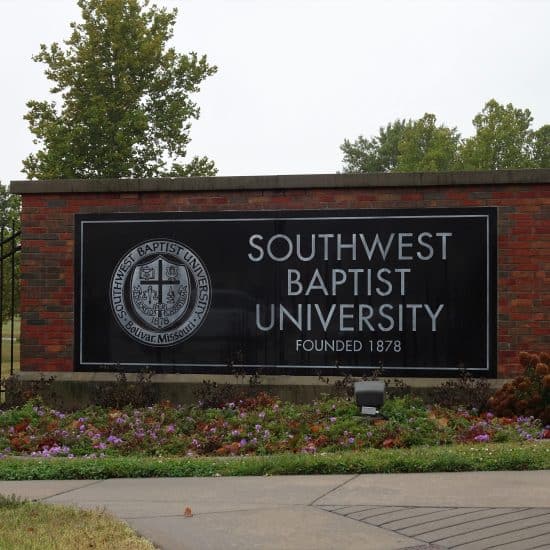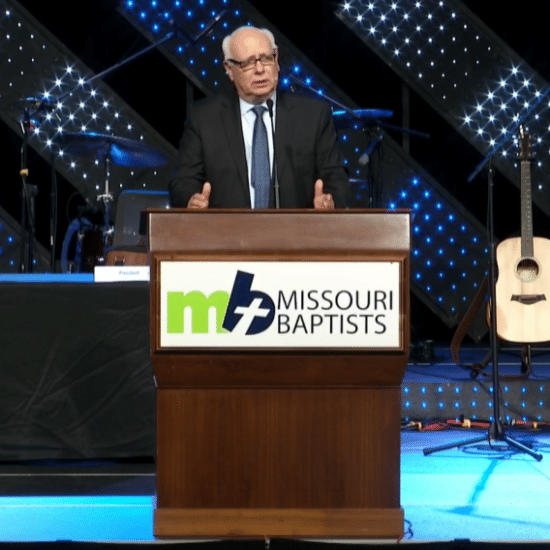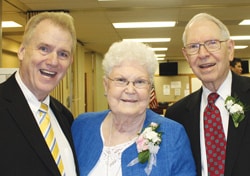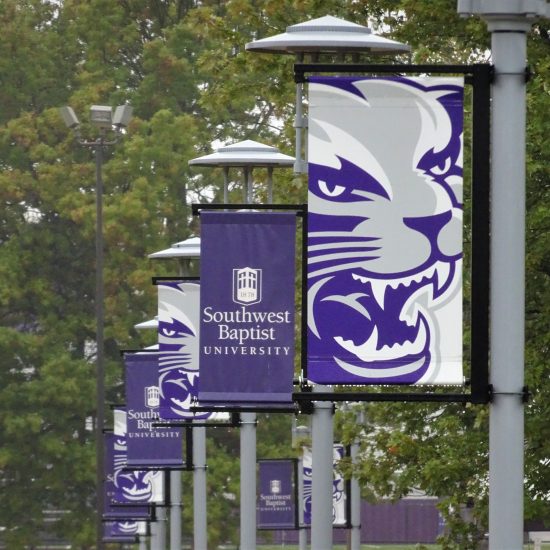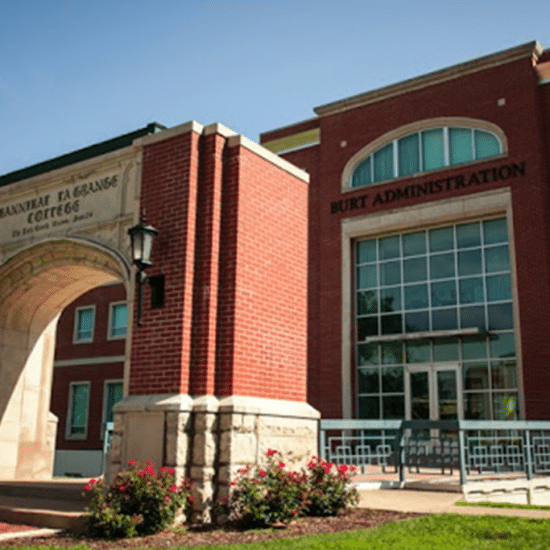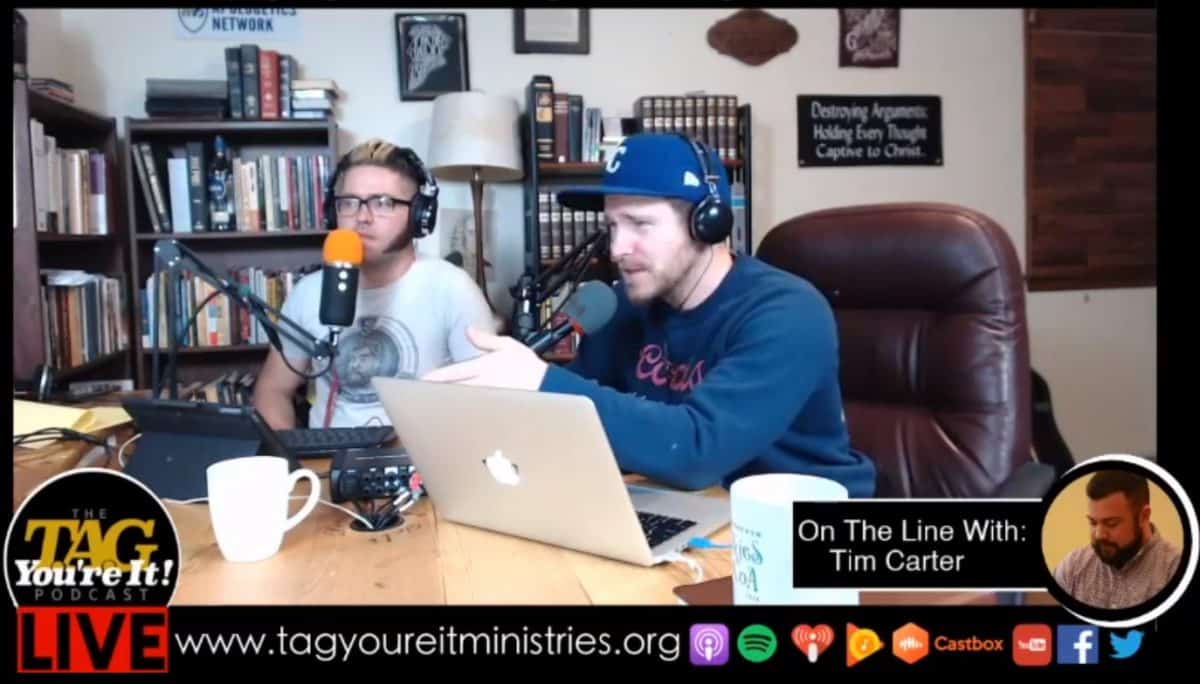
Two trustees at Southwest Baptist University took to the internet airwaves recently to attack Word&Way for covering the decision by SBU trustees to require religion professors at the school in Bolivar, Missouri, to affirm additional creedal documents. As the two made false claims and questioned the faith of Word&Way Editor Brian Kaylor, their conversation also revealed confidential information from a recent trustee meeting.
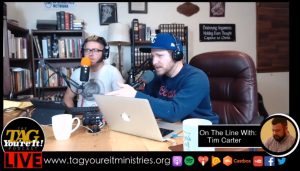
Screenshot of the Sept. 28 Facebook Live video of the “T.A.G. You’re It” podcast recording as Adam Cochurn (left) and David Van Bebber talk in their studio as Tim Carter joins in remotely.
SBU trustee David Van Bebber cohosts with Adam Cochrun the “T.A.G. You’re It” weekly podcast, a show mostly devoted to apologetics. After the two responded to a Word&Way report during a Sept. 14 program, another SBU trustee, Tim Carter, joined the program for two separate hour-long conversations on Sept. 21 and Sept. 28 devoted to responding to a Word&Way news report and a Word&Way editorial column.
Van Bebber serves as pastor at First Baptist Church in Buffalo and Carter serves as executive pastor and elder at Cornerstone Baptist Church in Sedalia. Both of them, along with Cochrun, are part of the Missouri Baptist Convention’s “Apologetics Network.”
Carter was among the five trustees elected to SBU’s Board last year after the Missouri Baptist Convention’s Nominating Committee deviated from standard practice and replaced SBU’s entire slate of trustees to put five new individuals on the Board. Last year, Van Bebber distributed a lengthy document attacking many of the religion professors at SBU, though his charges included several inaccuracies.
Confidential Information?
Both Van Bebber and Carter claimed in the Sept. 21 episode that a recent Word&Way article included non-public information by noting the MBC was demanding SBU adopt governing documents that affirm the BF&M 2000 and give the MBC greater legal authority. However, those two demands were referenced in a public motion passed by MBC messengers last year at the MBC’s annual meeting.
“These things that are being stated by Brian Kaylor should not be out to the public,” Van Bebber claimed. “There has been no official statement from SBU about the governing document’s changes. Nothing has been officially released.”
Carter echoed the idea that reporting on the MBC’s public demands was “information that is strictly confidential that shouldn’t be discussed.”
“I don’t know where [Kaylor] gets the information, but he’s talking about things he shouldn’t know,” Carter added. “It is troubling to say the least.”
In the Sept. 21 episode, Carter also complained that Kaylor reported about the upcoming requirement that theology professors affirm three additional statements. Saying he “can’t speak to confidential matters,” Carter questioned how Word&Way learned about the three statements and questioned if the news was even correct.
“Do we know that this is factual? Is this really being pushed right now?” Carter added.
A week later however, Carter changed his tune to confirm Kaylor’s report and publicly disclose confidential trustee matters as he acknowledged he himself had actually made the motions to require the three additional statements.
Carter also falsely claimed Kaylor wrote that the MBC pushed the three documents. However, Kaylor’s article and column repeatedly said SBU — not the MBC — made the requirement. The pieces merely noted the new SBU requirement came as the MBC has been pushing changes at the school through new trustees — like with the election of Carter.
Carter then complained that Kaylor was the one “fueling a fight” and creating division by reporting on the things Carter did.
Defending the Creedal Requirement
Beyond merely questioning — and then confirming — Word&Way’s report, the three also defended the new requirement passed by SBU’s trustees to require religion professors to not only affirm the Baptist Faith & Message 2000 but also the 1978 Chicago Statement on Biblical Inerrancy, the 1988 Danvers Statement on Biblical Manhood and Womanhood, and the 2017 Nashville Statement on sexuality.
Cochrun justified the requirement on Redford professors by claiming “Baptists are creedal people and we’re just acting like Baptists.” Carter and Van Bebber both expressed their agreement with Cochrun’s statement.
Van Bebber said individuals who attend churches who haven’t affirmed the BF&M 2000 shouldn’t serve as trustees at SBU or other MBC institutions, claiming that the BF&M 1963 has “an expiration date” on it. He added that “of course Missouri Baptist Convention Nominating Committees wouldn’t accept these individuals.” However, the MBC’s Nominating Committee rules actually require only individual affirmation of the BF&M 2000, not a church affirmation.
Van Bebber also argued Kaylor essentially argued for professors teaching theological beliefs like annihilationism and universalism — although the Redford professors so charged during the nearly two-year controversy at SBU have insisted they were falsely charged. However, Van Bebber spoke about the professors in the past tense, even though only one of the attacked professors has left the school.
“Here we have a guy who is essentially advocating, ‘Hey, they should have kept those professors who advocated for annihilationism. Oh hey, we should have kept those professors — they should have kept those professors who agreed that, you know, there should be an understanding of universalism. And then they should have kept those professors who affirmed a purgatorial view of individual eschatology.’”
Carter also defended the use of the new statements to interpret and explain the Bible, though he claimed Kaylor’s critique meant Kaylor didn’t want the Bible to speak for itself.
“In complaining about the Chicago Statement of Biblical Inerrancy, complaining about the Nashville Statement, the Danvers Statement, and even the BFM, what you’re saying is, ‘I don’t want the Bible to define for itself what it is; I want to define the Bible. I want to define what I like and what I don’t like.’ And you have to reject the inerrancy of Scripture to do that.” Carter claimed. “You have to let Scripture interpret itself and explain itself.”
Slavery Editorial
After discussing the news article, the three spent most of their time attacking Kaylor for his column on “Reading the Bible Like Enslavers.”
Van Bebber called the piece “dishonest” and “fallacious” for noting that Tom Nettles, a senior professor at Southern Baptist Theological Seminary in Louisville, Kentucky, wrote multiple essays defending the slavery of SBTS’s founders. But the article linked to in Kaylor’s column outlines Nettles’s arguments in the ongoing debate about honors to enslavers on SBTS’s campus. While Van Bebber claimed Nettles didn’t defend slavery, many others have noted Nettles did do, including Southern Baptist pastors Dwight McKissic and Alan Cross and former SBTS professor Bill Leonard.
Cochrun criticized Kaylor’s column for an alleged “liberal worldview” that comes from not believing in inerrancy.
“[Kaylor] doesn’t even have a standard to be able to judge anything like that,” Cochrun said. “If he’s not an inerrantist, he has no standard.”
“There is no Gospel in Brian Kaylor’s view. There is absolutely no Gospel. Why? Because the scriptures are not inerrant,” Cochrun added. “This is what Kaylor is basically speaking out against is being righteous, what we are called — well, I guess if you don’t have an infallible scripture it doesn’t matter what Jesus says.”
Carter offered a similar critique as he complained about what he saw in the editorial as “post-modern liberalism” and “cultural woke Christianity.” Thus, Carter called it “sick” and “not the Gospel” as he complained about “woke theology” he believes is “trying to divide people by the color of their skin.”
“I read this and I’m like, ‘You [Kaylor] don’t even believe the Bible,” Carter said.
Carter also criticized the piece for what he saw as “fallacious claims to try to scare individuals” away from the statements SBU trustees are requiring on Redford professors.
“This is what I expect from a high school student, writing an article such as this,” Carter added.
Kaylor’s coverage of the ongoing SBU-MBC controversy throughout 2019 won six awards earlier this year from the Associated Church Press, Baptist Communicators Association, and Religion Communicators Council.

